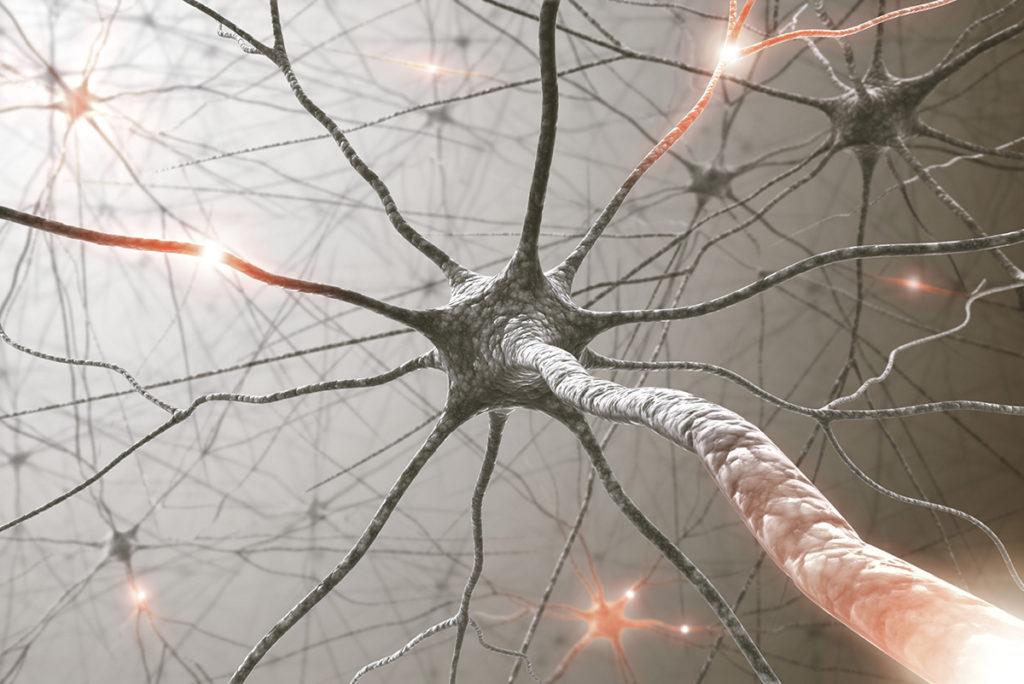Understanding Peripheral Neuropathy

Peripheral neuropathy refers to a collection of disorders that occur when nerves of the peripheral nervous system (the part of the nervous system outside of the brain and spinal cord) are damaged. Neuropathy can affect nerves that control muscle movement (motor nerves) and those that detect sensations such as coldness or pain (sensory nerves). In some cases, such as autonomic neuropathy, it can affect internal organs, such as the heart, blood vessels, bladder, or intestines. Peripheral neuropathies can result from traumatic injuries, infections, metabolic disorders, and exposure to toxins. One of the most common causes of peripheral neuropathy is diabetes.
Types of Peripheral Neuropathy
Peripheral neuropathy is broken down into different categories:
- Mononeuropathy. This is the involvement of a single nerve. Most often caused by prolonged pressure on a nerve, repetitive motions, or injury. Examples include carpal tunnel syndrome, ulnar nerve palsy, radial nerve palsy, and peroneal nerve palsy. Multiple mononeuropathy occurs when two or more nerves are individually affected.
- Polyneuropathy. The most common form of neuropathy is (symmetrical) peripheral polyneuropathy. This is generalized involvement of peripheral nerves, and it occurs when multiple peripheral nerves malfunction at the same time. The condition is often associated with poor nutrition, a number of diseases, and pressure or trauma. Examples include diabetic neuropathy and Guillain-Barre syndrome.
Neuropathies may also be categorized based on a functional classification (motor, sensory, autonomic, or mixed) or the type of onset (acute – hours or days, subacute – weeks or months, or chronic – months or years).
Causes of Peripheral Neuropathy
Peripheral neuropathies occur by one of three methods: acquired, hereditary, or idiopathic. Acquired neuropathies are the most common. They are caused by:
- Trauma or pressure on nerves, often from a cast or crutch or repetitive motion such as typing on a keyboard
- Nutritional/vitamin deficiencies
- Alcoholism
- Autoimmune diseases such as lupus, rheumatoid arthritis, and Guillain-Barre syndrome
- Tumors, which often press up against nerves
- Other diseases and infections, such as kidney disease, liver disease, Lyme disease, HIV/AIDS, or an underactive thyroid (hypothyroidism)
- Poison exposure, from toxins such as heavy metals, and certain medications and cancer treatments
About 30% of neuropathy cases are considered idiopathic, which means they are of unknown cause. Less common are hereditary neuropathies, such as Charcot-Marie-Tooth disease and amyloid polyneuropathy.
Neuropathic Pain and Treatment Options
Neuropathic pain is often described as a tingling or burning sensation, and peripheral neuropathy often causes pain and numbness in the hands and feet. Symptoms may improve if the neuropathy has an underlying condition that can be cured or better managed. However, neuropathic pain often responds poorly to standard pain treatments and for some people, it can get worse instead of better over time – leading to serious disability.
Antidepressants, especially tricyclics and selective serotonin-norepinephrine re-uptake inhibitors (SNRI’s), have shown great promise in relieving neuropathic pain. These may treat both the pain and symptoms of depression or anxiety caused by the chronic pain. Antiseizure medications may also be effective in managing neuropathic pain.
If your neuropathic pain does not improve, your doctor may refer you to a pain management specialist. After a complete medical history, he or she may recommend a multidisciplinary approach that combines different therapies to relieve your neuropathic pain. This may include a combination of medication, physical therapy, psychological counseling, and other treatments.

